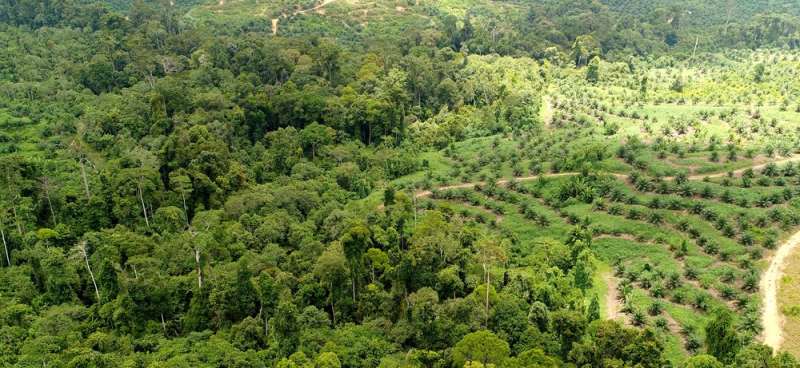Supermarket Beef Is Battleground for Deforestation Debate

Palm oil can be establish in food and cosmetics everywhere: in fact, one-half of the world'due south population uses palm oil in food. But public awareness about the loss of wildlife through deforestation caused by palm oil crops is growing, and there's mounting pressure level on retailers to reduce their sales of palm oil products, or boycott them altogether.
The fence has become particularly heated since a Christmas advert by United kingdom of great britain and northern ireland-based supermarket chain Iceland – which dramatises the link between palm oil, deforestation and the death of orangutans—was banned from being broadcast in the Great britain, on the basis that it would have breached political advertizement laws, because the animation was originally produced by Greenpeace.
In the first four days of its release, the video was viewed 13m times. A petition to overturn the advertising ban has and so far attracted more than 720,000 signatures. Only while Republic of iceland's entrada has been a smashing way to bring more public attention to food sustainability problems, an outright boycott on palm oil products could actually lead to more than problems for forests and wildlife.
The evidence
A contempo report by the International Union for the Conservation of Nature, ended that boycotting palm oil would just shift – rather than counter – losses to rainforests and wildlife caused by agriculture. Put simply, boycotted palm oil would need to be replaced by other types of vegetable oil to meet global demand – and that could actually make matters worse.
This is because, compared to other common sources of vegetable oil – such equally rapeseed and soybeans – palm oil crops yield 4 to ten times more oil per unit of land, and crave far less pesticide and fertiliser. In fact, palm oil makes up 35% of all vegetable oils, grown on just x% of the state allocated to oil crops.
And so, if other crops such as soybean replaced a shortfall in palm oil, this would non only shift more production to the Amazon (a major soy-producing region), information technology would also require more state, leading to more deforestation. Indeed, soybean farming is already responsible for more than double the deforestation of palm oil. In the context of other food sources, livestock and beef production has led to more than than 5 times the amount of deforestation, compared to palm oil.
Sustainable palm oil
Certification – a machinery by which consumers pay higher prices for more responsibly sourced products – is one way to help safeguard rainforests, and the wildlife which lives in them. Palm oil certification is spearheaded by the Roundtable on Sustainable Palm Oil (RSPO), who are leading the market toward environmentally and socially responsible palm oil that doesn't contribute to deforestation.

Every bit the RSPO meets to renew its sustainability commitments, 1 major challenge facing the sector is that less than 20% of the world's palm oil is currently certified as sustainable.
There is little incentive for producers to seek certification – or for retailers to promote environmentally and socially responsible products – as long equally the debate continues to focus on boycotting palm oil birthday. As a outcome, only about half of sustainable palm oil is actually sold every bit certified, because a large proportion of the market is not willing to pay the premium for sustainable products.
Despite this, many large retailers and leading brands (including Nestlé, Unilever and Palmolive) and supermarkets (such as Morrison's, Waitrose and Sainsbury's in the United kingdom of great britain and northern ireland) are already using certified palm oil in their products, merely cannot heavily promote this due to the persistent negativity toward any type of palm oil.
Wildlife friendly plantations
To help the palm oil industry to safeguard wild animals, conservation scientists are working with certification bodies and producers to improve how palm oil tillage affects biodiversity. It tin can exist every bit elementary as growing the ingather on not-forested areas. But information technology tin can too involve protecting forests along rivers, such that they join up patches of loftier quality forest within the palm oil landscape, allowing wildlife to movement more freely.
If certification of palm oil becomes more popular, information technology will improve prospects for wildlife, including orangutans. This is why major conservation organisations – including leading orangutan charities and Greenpeace – continue to support certified palm oil, rather than a cold-shoulder. And now, environmentally conscious consumers tin can check where they tin can buy products that contain responsibly sourced palm oil.
Hopefully the involvement sparked by Iceland'south advert will bring positive changes for rainforests and their wild animals. Just a boycott is not the all-time answer. The best thing retailers can do is back up their suppliers to bring more responsibly sourced products to the supermarket shelves this Christmas.
This article is republished from The Conversation nether a Artistic Commons license. Read the original article.![]()
Citation: Palm oil boycott could actually increase deforestation – sustainable products are the solution (2018, November fourteen) retrieved 4 June 2022 from https://phys.org/news/2018-eleven-palm-oil-cold-shoulder-deforestation-sustainable.html
This document is subject to copyright. Apart from any fair dealing for the purpose of individual study or research, no part may be reproduced without the written permission. The content is provided for information purposes simply.
mcclellandtakether.blogspot.com
Source: https://phys.org/news/2018-11-palm-oil-boycott-deforestation-sustainable.html
0 Response to "Supermarket Beef Is Battleground for Deforestation Debate"
Post a Comment